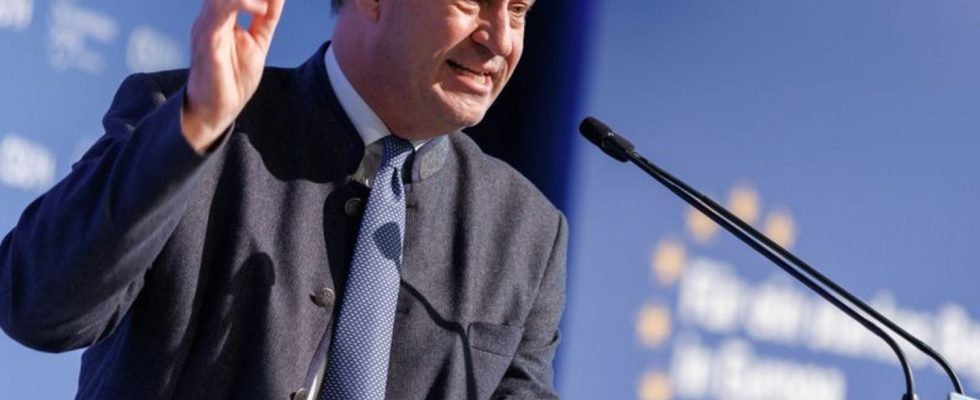Household
Disagreement about the future of the debt brake
Markus Söder (CSU) speaks during the CSU delegates’ meeting for the European elections. photo
© Daniel Karmann/dpa
It seems clear that savings need to be made after the Karlsruhe budget ruling. Decisions could come in the new week. But even the plaintiff Union has differences of opinion.
The federal government and the opposition are holding consultations on Karlsruhe ahead of next week’s planned meeting Budget verdict no agreement on further course. Bavaria’s Prime Minister Markus Söder sees Germany in a “serious state crisis” because of budget problems. “This government has run aground,” said Söder at the CSU delegates’ meeting for the European elections in Nuremberg.
He spoke out against using the debt brake to solve budget problems, as some CDU prime ministers are also calling for. “The debt brake made us strong, this is the only way help is possible in crisis situations,” wrote Söder on the X platform (formerly Twitter).
Economics Minister Robert Habeck (Greens) and the economics and energy ministers of the federal states wanted to discuss the effects of the ruling in Berlin on Monday. Chancellor Olaf Scholz (SPD) has announced a government statement for Tuesday.
After the Karlsruhe budget ruling, there is a big gap in the budget. The Federal Constitutional Court had declared a reallocation of loans worth 60 billion euros from the 2021 budget to be invalid. Finance Minister Christian Lindner (FDP) announced on Thursday that he would present a supplementary budget for 2023 to the cabinet next week. According to his ministry, the government wants to propose to the Bundestag to declare an extraordinary emergency, which would allow the debt brake to be suspended. The aim is to subsequently legally secure loans that have already been used this year.
Union divided
The opposition Union sued in Karlsruhe. After the clear verdict, she initially cheered and made a clear commitment to the debt brake. CDU party leader Merz said on Tuesday: “I don’t see at the moment that we have to approach the debt brake.” The “Handelsblatt” reported on Sunday that the CDU would forego a new lawsuit if the federal government declared an emergency for the current fiscal year. Merz explained this at a meeting with the Union’s Prime Ministers. His spokesman did not want to comment when asked.
The CDU state leaders in Berlin, Saxony-Anhalt and Saxony, on the other hand, have recently shown themselves to be open to reforming the debt brake. Berlin’s governing mayor Kai Wegner wrote on X on Thursday: “The debt brake is a good idea in the sense of sound finances. However, I consider its current design to be dangerous.”
Saxony-Anhalt’s Prime Minister Reiner Haseloff told “Stern” that the debt brake must remain. “But for very important future investments in business, technology and science, constitutionally compliant ways must be found to realize them.” North Rhine-Westphalia’s Prime Minister Hendrik Wüst was more reserved but willing to talk. In his view, reform should only be the last of all options, as he made clear on Friday evening on ARD.
Reform rejection from the government
Federal Transport Minister Volker Wissing declared the discussion about reforming the debt brake a sham debate. “There is obviously no majority to change the constitution,” he told the German Press Agency in Mainz. “This is an abstract debate, but we have a concrete problem.”
In order to reform the debt brake, the Basic Law would have to be changed. This requires a two-thirds majority in the Bundestag and Bundesrat. On Friday, government spokesman Steffen Hebestreit said that such a reform was not currently pending.
Scholz wants to implement the judgment quickly
Scholz once again announced a rapid restructuring of the federal budget. “Once the court has spoken, it’s just a matter of implementing it,” he said on Saturday at a party conference of the Brandenburg SPD in Schönefeld near Berlin. And this should happen quickly. A debate is planned on Tuesday following his government statement on the budget situation. The cabinet meets on Wednesday. The Bundestag is scheduled to discuss the supplementary budget for 2023 for the first time on Friday.
Green state finance minister open to social cuts
After the Constitutional Court ruling, the Baden-Württemberg Finance Minister Danyal Bayaz (Greens) is also open to cuts in the social sector at the federal level. “Social projects such as pensions at 63 or mothers’ pensions should not be set in stone,” he told the “Frankfurter Allgemeine Sonntagszeitung”. The state cannot compensate for every crisis; this is a promise that cannot be kept.

